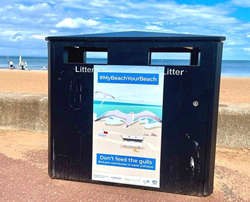Angie Brown* talks to ornithology authorities who reject the message that feeding seagulls adds to ocean pollution.
 Posters warning people at Scottish beaches not to feed seagulls as ‘bird poo contributes to water pollution’ have been challenged by ornithology experts.
Posters warning people at Scottish beaches not to feed seagulls as ‘bird poo contributes to water pollution’ have been challenged by ornithology experts.
The signs are part of the Keep Scotland Beautiful’s My Beach Your Beach campaign.
It said it targeted beaches “which face challenges with bathing water quality”.
However, the Royal Society for the Protection of Birds (RSPB) Scotland and the British Trust for Ornithology said they did not support the message on the posters which have been posted along seven beaches.
An RSPB spokesperson said seabird droppings, known as guano, were important sources of nutrients for marine life such as phytoplankton.
“Herring gulls have declined by more than 50 per cent since 1970 and are continuing to do badly, along with other seabirds, due to changes in natural food supplies,” the spokesperson said.
“Gulls need our help, or at least our tolerance. All the species breeding in the United Kingdom are of conservation concern with some in very serious trouble.”
The spokesperson said gulls had traditionally lived along Britain’s coastlines and people could help by learning to live alongside them.
“Guano contains phosphorus and nitrogen which allow phytoplankton to grow, which feeds a variety of marine species, from snails to fish that humans eat,” the spokesperson said.
“Feeding gulls in urban environments is not recommended as it could encourage gulls to beg, swoop for, or steal food from people.”
However, the charity did not support the idea that seabirds polluted seawater, as droppings were part of nature’s cycle.
Science Communications Manager at the British Trust for Ornithology, Viola Ross-Smith, who has a PhD in the study of gulls, said she disputed the message on the posters.
“I would challenge this message. Herring gulls weigh about a kilo and their poos aren’t that big and are pretty innocuous. It doesn’t compare to the amount of sewage and wet wipes that we put into the sea,” Dr Ross-Smith said.
“We are the ones utterly affecting our environment, not seabirds.”
*Angie Brown is a reporter for the British Broadcasting Corporation, based in Edinburgh, who loves birds, especially owls, capercaillies, and the big fat wood pigeons in her garden.
This article first appeared on the BBC website.


